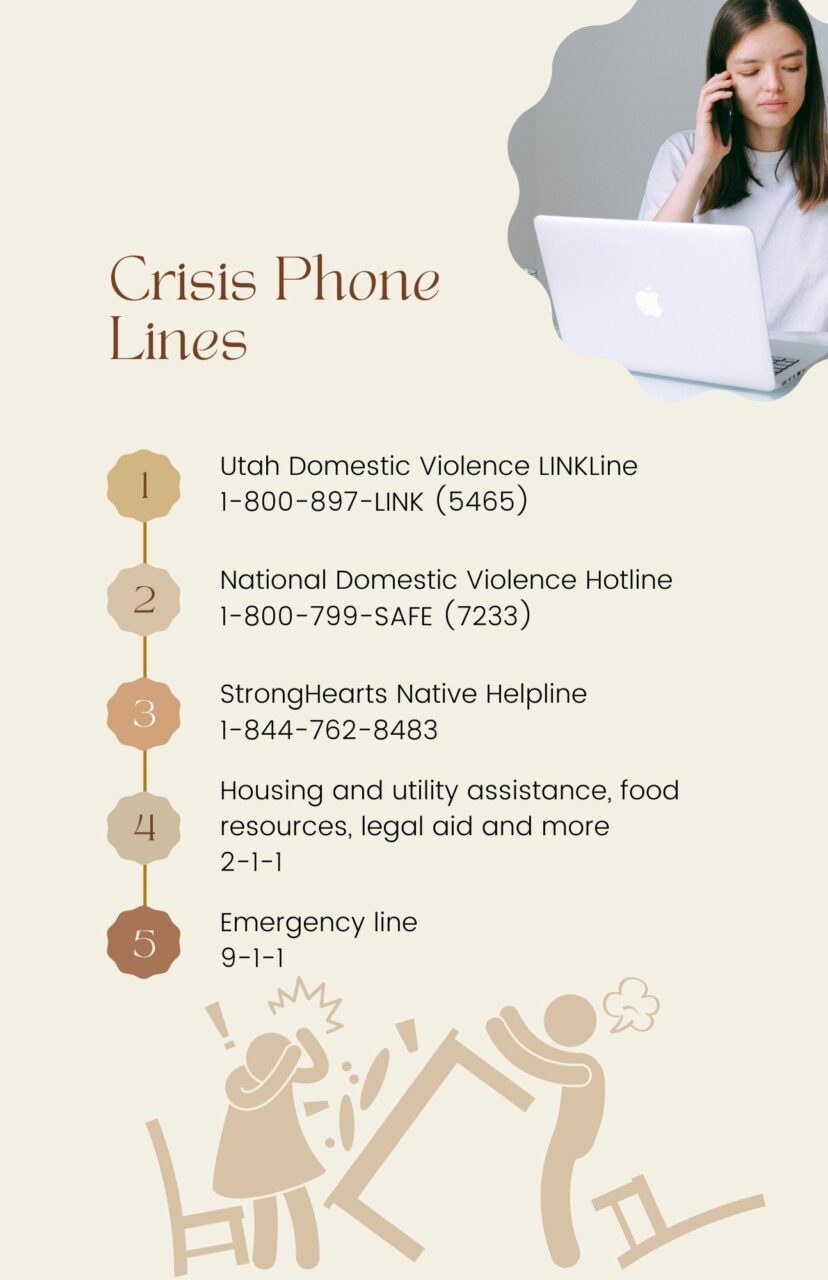
When Jennie Bigelow returned home from her mission for The Church of Jesus Christ of Latter-day Saints, she didn’t realize the word “domestic abuse” could have even been used to describe her home life before then.
At age 20, Bigelow had never done any research into domestic violence and narcissism. To her, life was normal. However, upon returning home from Brazil, she said friends commented that her experiences with her father were not normal.
“When I got home from my mission, I had a friend who was like, ‘Jennie, I think you need to look into narcissism. It seems like something is wrong’,” Bigelow recounted.
After doing some research into domestic violence and narcissism, it hit her like a brick to the chest: her father was abusive. As a victim of domestic violence, she had always known something wasn’t quite right, she said. However, she had never fully realized how bad it really was.
Her first memory related to the violence her father inflicted on their family was an incident that took place when she was only seven years old; Her father had attacked her mother, unprovoked, in the bathroom of their home by choking her.
Bigelow, who was in second grade at the time, stepped in and pulled her father off of her mother, tearing his shirt in the process. This experience was only one of many in an endless string of incidents, she said. Bigelow described the abuse as “always happening,” often involving physical violence with her mother and her sister.
Once Bigelow was aware of the abuse, it was impossible to ignore. Not long after returning home from her mission, her father threatened the family with a gun, she said. At that point, after two decades of abuse, Bigelow’s father was arrested. She no longer has contact with him.
In Utah, many women have stories similar to Bigelow’s.
Statistics on domestic violence
According to a study done by Utah State University, one in three Utah women will experience some form of domestic violence in her lifetime. Beyond that, 40% of Utah homicides were found in the study to be domestic violence-related.
The study also concluded that women are not in the dark about the impact these issues are having on their communities. In the same study, 86% of women told researchers they believed domestic violence was an issue in their communities and 63% of women believed the level of violence was increasing.
Between 2009 and 2016 in Utah, there were 84 incidents of intimate partner-related homicide, where the suspect was a current or former intimate partner; 49% of those incidents were murder-suicides.
The statistics also show that oftentimes, women are threatened with violence numerous times before they are killed in homicides. In 54% of these cases, a friend or family member reported these threats to the police.
These statistics come to life when remembering cases that recently received statewide attention relating to intimate partner violence. Lauren McCluskey, a student at the University of Utah, was murdered by her ex-boyfriend in 2018 at the age of 21.
McCluskey began dating Melvin Rowland after meeting him at a Salt Lake City bar. Soon after, McCluskey found out Rowland was lying to her about several aspects of his life including his age and criminal record. She broke up with him.
For weeks after the breakup, Rowland tried several ways to contact McCluskey and threaten her. Eventually, he took her life while she was on the phone with her mother. McCluskey had called the police several times, but no action was taken on her case before her murder.

Why women stay
For many women, abusive relationships can last years and sometimes a lifetime. Those who have never been inside an abusive relationship may wonder why anyone would choose to stay with someone who mistreats them, even when the signs are clear and the behavior is violent.
According to the National Coalition Against Domestic Violence, there are multiple reasons a woman may stay with an abusive partner. For one, abusers often go to extremes to keep their victims from leaving. Reasons a victim might stay can be incredibly complex, researchers with the coalition explain on their website.
Financial threats and abuse can be exerted over the victim, allowing her little autonomy to begin a new life for herself away from her abuser. Victims may also be unaware of what sorts of help exists for people in their situations. Traditional beliefs about two-parent households, as well as religious beliefs, can also be a factor.
The coalition explains abusive relations can also be complex in what they entail. Most abusive relationships are roller coasters: a mix of the lowest lows, and the highest highs.
According to the Iowa Victim Service Call Center, another reason someone in an abusive relationship may not leave is they may believe their abuse is normal. If someone has not had a healthy relationship modeled for them, they may mirror the patterns of family members.
The call center website says the situation can also be the exact opposite, where women have never been in an environment where abuse is common, which then leads to the victim not knowing whether or not their relationship is healthy.
The coalition also reports victims experience fear that “that the abuser’s actions will become more violent and may become lethal if the victim attempts to leave.”
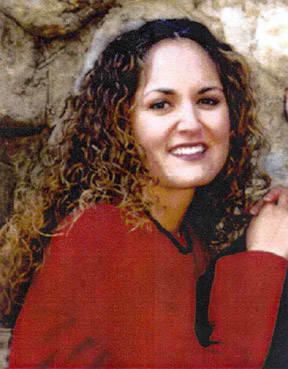
In 2004, Salt Lake City resident Lori Hacking was killed by her husband after she discovered he had been lying about earning his undergraduate degree and continuing on to medical school. Hacking was pregnant at the time of her murder.
Ultimately, love is a lasting factor as well. Iowa Victim Service Call Center states that often victims deeply love their partners and want to make the relationship work. Their love can be extended by having children with the abuser and wanting to keep the family unit together.
BYU Title IX coordinator Tiffany Turley said love is one of the main reasons she sees victims hesitate to leave and report their abusive partners.
“That’s someone (they are) in a relationship with or married to, and so obviously there’s a lot of feelings there. In an effort to not hurt that other person, that is such a common response that we see,” Turley said.
West Valley City resident Susan Powell went missing from her home in 2009. Friends said they encouraged Powell to leave her husband, Josh Powell, multiple times after arguments and other incidents. However, Susan Powell stayed with her husband and continued to document evidence of her abuse with friends and at work.
Some of her friends alleged eventually that Susan told them of her commitment to leave her husband by a certain date if nothing changed. She disappeared before she could ever do so.
Her husband was suspected of murdering Susan, but police said the evidence was never strong enough to charge him with her disappearance. He left Utah not long after her disappearance and eventually killed himself and his sons.
Now, the case into her disappearance has been closed by West Valley Police, as they believe Josh is the one who took Susan’s life.
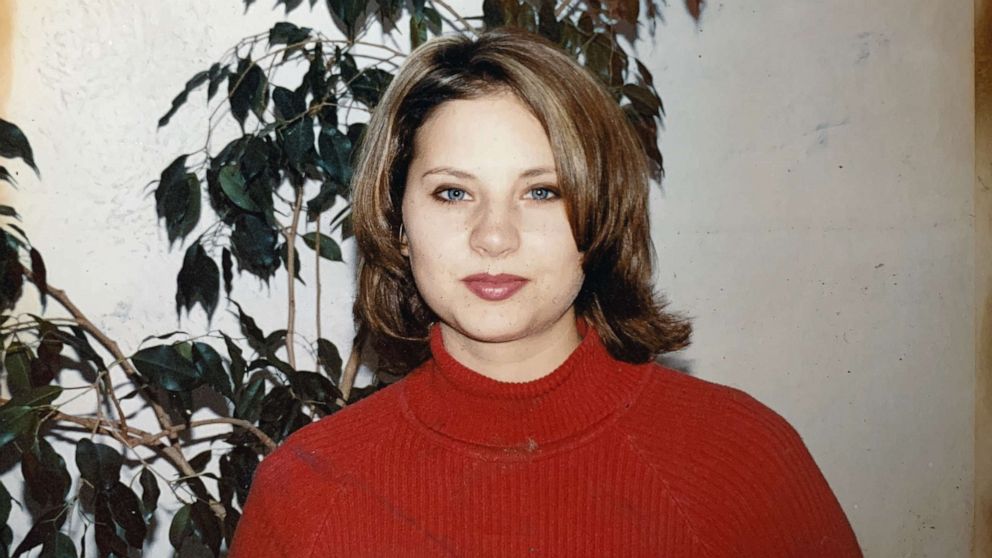
Impact on families
According to the Utah Domestic Violence Coalition, within the 84 cases surveyed, 44 children were directly exposed to the violence in some way.
BYU School of Family Life professor and program director Jason Whiting has spent a large chunk of his time studying relationship conflicts and domestic violence, control and deception.
Whiting said when children grow up in an environment where abuse is common, there is lasting trauma left within them throughout their lives. The experience of witnessing arguing is stressful for children, according to Whiting.
“Kids are like little barometers. They absorb the emotional climate that’s going on in the house,” Whiting said when asked about how children are impacted by seeing abuse in their homes.
To help her cope with the trauma at home, Bigelow became deeply involved with school, friends and extracurriculars in order to avoid being near her father. Beyond that, friends were never allowed to come to her home out of fear they would see what was going on.
“I almost felt like I was escaping when I went to school and when I went to my friends’ houses,” Bigelow said.
Whiting also said children can experience something known as intergenerational transmission of abuse. This means children who witness domestic violence are more likely to both perpetuate and be victims of violence in the future.
Bigelow said in her personal experience, the abuse from her father changed her entire outlook on love. After going to therapy twice a week, she began dating but was met with challenges in letting herself trust anyone. “Falling in love was the scariest thing that had ever happened to me,” Bigelow said.
Whiting stressed that not all children will become perpetrators or victims of abuse in adult life. One of the major ways to avoid these impacts, he said, is to have positive adult role models in their lives.
“When we talk about resiliency, kids who also have a mentor figure or adult in their life that they can trust, those kids are going to do better than the kids who don’t have that,” Whiting said.
Safety as empowerment
The Young Women’s Christian Association states on their website one of the reasons their organization and others promote safety is because “safety and freedom are at the heart of women’s empowerment.”
There are options across the state of Utah for those who are seeking help with an abusive situation. One of the first things organizations provide for women seeking help is educating them on what kinds of behavior constitute red flags for an abusive partner.
According to the Young Women’s Christian Association, extreme jealousy and possessiveness are indicators a partner may be abusive. A few other red flags include verbal abuse, cruelty to animals or children and unpredictability.
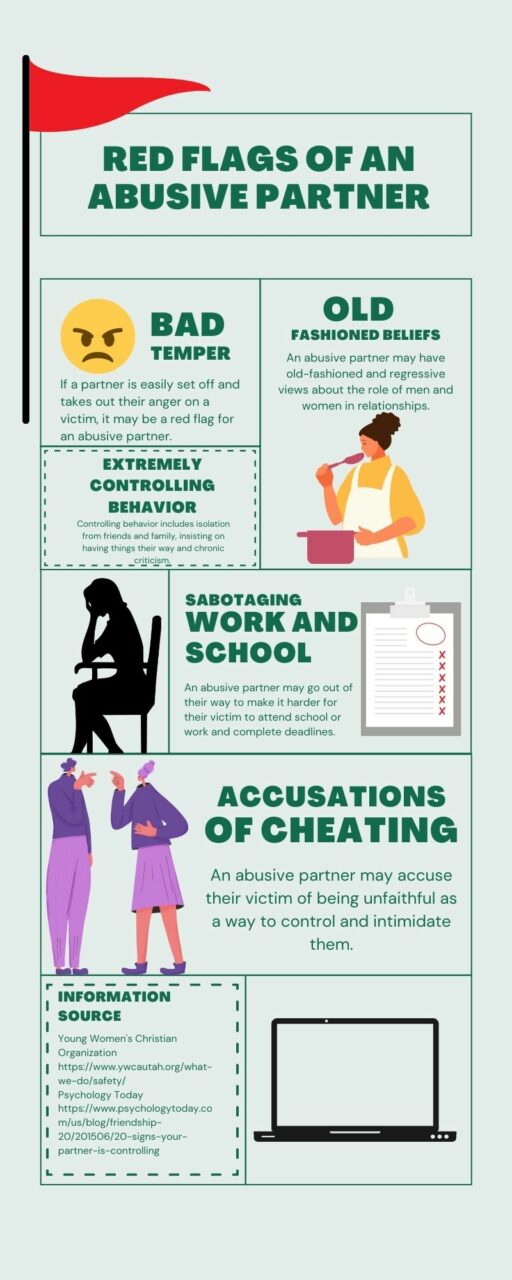
Turley said another red flag she recommends looking out for is someone who disrespects the boundaries of their partner and consistently pushes their partner to break those boundaries. “If someone disregards a boundary that you set, physical or otherwise, usually that is an indicator they don’t respect you,” Turley said.
For Bigelow, escaping abuse changed her life. After cutting off contact with her father, Bigelow met her future husband, Ethan. Her relationship with him helped her understand what real love was supposed to look like.
“I’ve learned that real love means you’re not always going to agree, but disagreeing does not mean that the love goes away. Another thing I have learned is that love is not supposed to hurt,” Bigelow said.
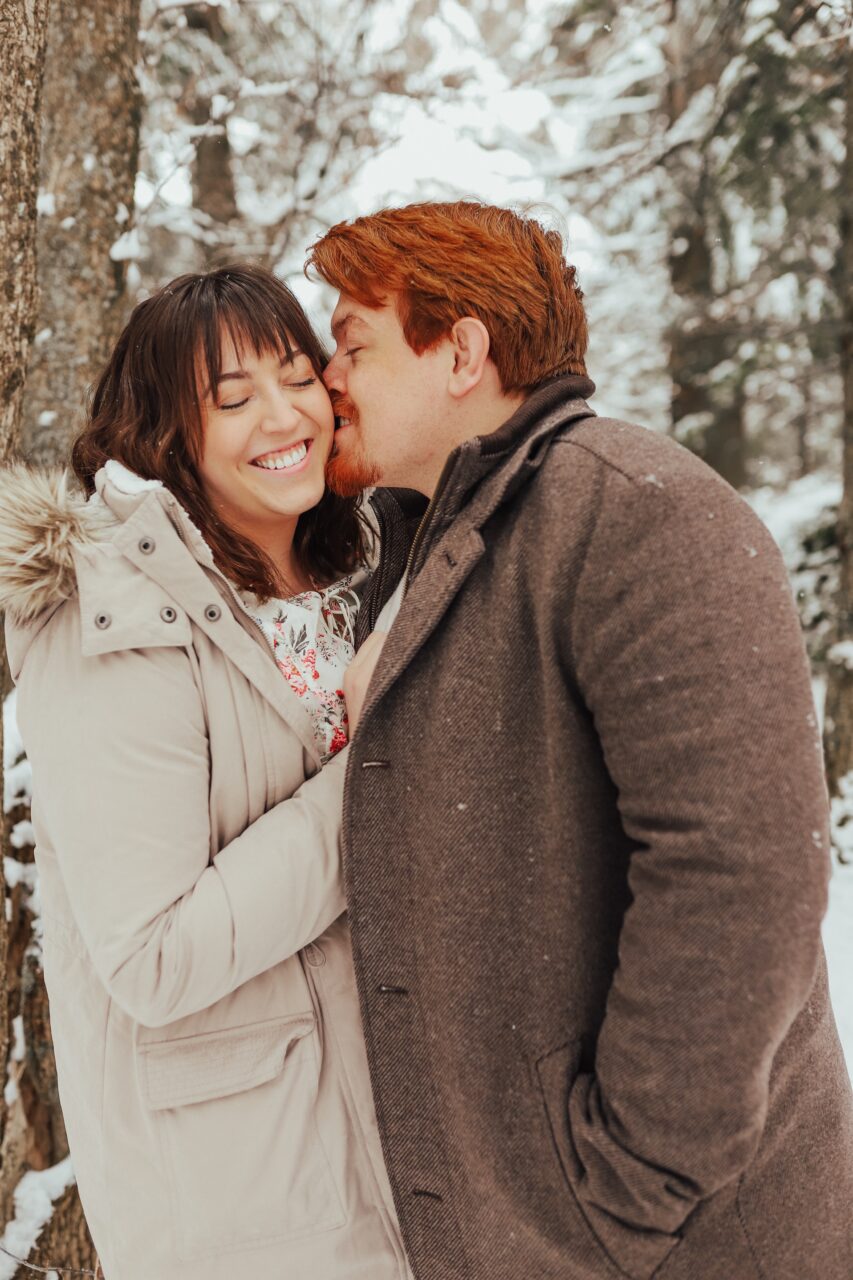
Bigelow also said the most important advice she can give to women who are still struggling or feel trapped by domestic abuse is to get help.
“Reach out to authorities if you feel comfortable and safe (to do so). I also think it is so crucial to write down every single time that your partner has hurt you. Take pictures and (create) records to be used as future evidence,” Bigelow said.
As for concerned family and friends of a victim, Bigelow encouraged anyone who knows of abuse happening to call authorities. She wished during her childhood that someone who loved them would have stepped in, even if it meant risking their relationship with the victims.
Beyond contacting authorities, Bigelow also said it’s important to remember in many cases of domestic violence a victim may not yet be ready to leave. Sometimes, a victim just needs someone to listen to them and hear them out.
Below is a map of domestic violence shelters and mental health services for victims of domestic violence in Utah and Salt Lake Counties. Purple pins are organizations that provide counseling and other resources, while blue pins indicate emergency housing services.
Across the state of Utah, there are different resources available for abuse victims. Counseling and housing services can be found in most counties. Crisis phone lines are also available 24/7 across the state and country for those who need immediate assistance.
